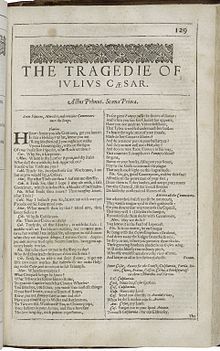



The Tragedy of Julius Caesar is a history play and tragedy by William Shakespeare, believed to have been written in 1599. It is one of several plays written by Shakespeare based on true events from Roman history, which also include Coriolanus and Antony and Cleopatra.
Although the play is named Julius Caesar, Brutus speaks more than four times as many lines as the title character; and the central psychological drama of the play focuses on Brutus' struggle between the conflicting demands of honour, patriotism, and friendship.

The ghost of Caesar taunts Brutus about his imminent defeat. (Copperplate engraving by Edward Scrive...
Date and text
Julius Caesar was originally published in the First Folio of 1623, but a performance was mentioned by Thomas Platter the Younger in his diary in September 1599. The play is not mentioned in the list of Shakespeare's plays published by Francis Meres in 1598. Based on these two points, as well as a number of contemporary allusions, and the belief that the play is similar to Hamlet in vocabulary, and to Henry V and As You Like It in metre, scholars have suggested 1599 as a probable date.
The text of Julius Caesar in the First Folio is the only authoritative text for the play. The Folio text is notable for its quality and consistency; scholars judge it to have been set into type from a theatrical prompt-book.
The play contains many anachronistic elements from the Elizabethan era. The characters mention objects such as hats and doublets (large, heavy jackets) – neither of which existed in ancient Rome. Caesar is mentioned to be wearing an Elizabethan doublet instead of a Roman toga. At one point a clock is heard to strike and Brutus notes it with "Count the clock".

The first page of Julius Caesar, printed in the Second Folio of 1632
